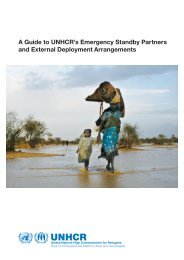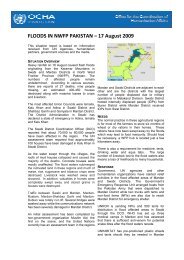Advocacy and resource mobilisation - OneResponse
Advocacy and resource mobilisation - OneResponse
Advocacy and resource mobilisation - OneResponse
Create successful ePaper yourself
Turn your PDF publications into a flip-book with our unique Google optimized e-Paper software.
<strong>Advocacy</strong> <strong>and</strong> <strong>resource</strong> <strong>mobilisation</strong><br />
� orientation of national <strong>and</strong> local partners on the humanitarian reform<br />
process <strong>and</strong> cluster approach, <strong>and</strong> the purpose <strong>and</strong> working modalities<br />
of the Education Cluster<br />
� minimising information <strong>and</strong> reporting requirements to save time <strong>and</strong><br />
accommodate weaker IM <strong>and</strong> reporting capacities of some national <strong>and</strong><br />
local organisations<br />
� minimising dem<strong>and</strong>s on national counterparts to attend a proliferation of<br />
cluster meetings in addition to government coordination meetings<br />
� providing information <strong>and</strong> training in forms which are appropriate to<br />
local actors, eg, consider use of language <strong>and</strong> terminologies, translation,<br />
underst<strong>and</strong>ing of signs <strong>and</strong> diagrams<br />
� promoting good human <strong>resource</strong> management practice, including a<br />
policy of working through local organisations rather than poaching<br />
skilled staff (see www.peopleinaid.org for further information).<br />
8.3.4 Developing capacities<br />
Another strategy for addressing education programming <strong>and</strong> cluster coordination<br />
capacity shortfalls is to invest in developing the capacity of existing cluster<br />
partner agencies <strong>and</strong> staff.<br />
Definition: Capacity development is the process by which individuals, groups,<br />
organisations, institutions <strong>and</strong> societies increase their ability to:<br />
� perform core functions, solve problems, define <strong>and</strong> achieve objectives<br />
� underst<strong>and</strong> <strong>and</strong> deal with their development needs in a broad context<br />
<strong>and</strong> in a sustainable manner. 58<br />
Human <strong>resource</strong> capacity consists of a combination of knowledge, skills <strong>and</strong><br />
attitudinal behaviour. These capacities are developed in different ways. Skills <strong>and</strong><br />
knowledge can be learned, eg, through access to learning materials, training, or<br />
learning from others. However, attitudes relate to the way in which people use<br />
their skills <strong>and</strong> knowledge to address particular tasks, or in particular situations.<br />
Attitudes are developed or changed through experience <strong>and</strong> the influence of<br />
others.<br />
Where available, the Education Cluster Preparedness <strong>and</strong> Capacity Development<br />
Action Plan or cluster contingency plan will provide an outline of the priority<br />
capacity development activities required in relation to the current emergency, <strong>and</strong><br />
appropriate ways of undertaking these (see section 7.6). Capacity development<br />
requirements should be informed by:<br />
� cluster partner capacities in the thematic areas<br />
58 UNESCO (2009) Guidelines for Planning Education In Emergencies <strong>and</strong> Reconstruction<br />
May 2010 | 275











